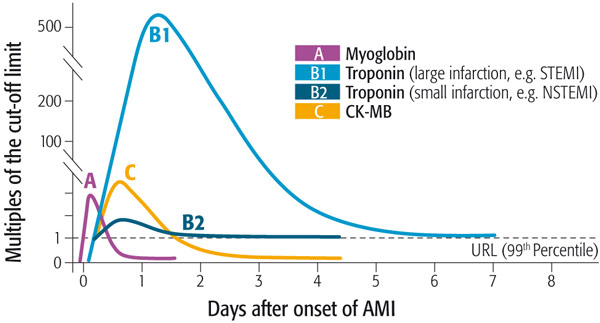Myo - The earliest abnormally increased cardiac protein marker after myocardial injury
Myoglobin (Myo) is a binding protein composed of a peptide chain and a heme prosthetic group. It is mainly distributed in cardiac and skeletal muscle tissues and has the function of transporting and storing oxygen in muscle cells. When the myocardium is damaged, it diffuses out of the myocardium and enters the blood circulation.
Myo protein is a small molecular substance, which is the earliest abnormally increased cardiac protein marker after myocardial injury. In acute myocardial infarction (AMI), the serum myoglobin concentration deviates from the normal value within 2 to 3 hours in the initial stage of chest pain, reaches the highest value in 6 to 9 hours, and returns to normal in about 24 hours.
Therefore, within 1.5 to 6 hours after the occurrence of AMI, the dynamic detection of serum myoglobin level can early diagnose whether AMI occurs. If the second detection value is significantly higher than the first detection value, it has an extremely high positive predictive value; if there is no difference between the two detected values of dynamic detection, it has a 100% negative predictive value, excluding the possibility of AMI.
Blood myoglobin concentrations are useful for monitoring the diagnosis and treatment of AMI. And it can be used as an indicator of coronary re-dredging in thrombolytic therapy. Myoglobin concentration reaches the highest after 30 minutes to 2 hours of coronary dredging.
Myo antibody has high sensitivity in the early detection of myocardial injury, but poor specificity. It should be noted that myoglobin may be elevated in severe shock, severe extensive trauma, end-stage renal insufficiency, myocarditis, acute infection, myositis, or myopathy. Therefore, attention should be paid to the differential diagnosis with AMI, and the nature of chest pain cannot be determined based on the Myo single test results.

Today, clinical diagnosis of AMI usually requires combined detection of cTnI antibody, CKMB, and Myo. The sensitivity of CKMB protein is lower than Myo in the early diagnosis of AMI, but the specificity is higher. cTnI has myocardial specificity and is the most reliable marker for the detection of myocardial infarction, but it begins to increase 3-8 hours after chest pain occurs. If cTnI is detected alone, it may not be able to diagnose early AMI patients. Therefore, the dynamic combo test of Myo, cTnI, and CKMB within 6 hours of chest pain is helpful to timely and accurately distinguish AMI patients, thereby creating conditions for the timely rescue of patients.
Related Immunoassays
Immunoassay News
- Cardiac Markers
-
Tumor Marker
-
PGII
-
G17
- CA50
-
CA125
- CA242
-
CA15-3
- CA19-9
- CA72-4
-
Pepsinogens I (PGI)
-
Human Epididymis 4 (HE4)
- Prostate-Specific Antigen (PSA)
- Squamous Cell Carcinoma (SCC)
- Neuron-Specific Enolase (NSE)
- Cytokeratin 19 Fragment (CYFRA21-1)
- Human Progastrin-releasing Peptide (ProGRP Tumor Marker)
- Protein Induced by Vitamin K Absence or Antagonist-II (PIVKA II Tumor Marker)
- Alpha-fetoprotein(AFP)
-
CEA
-
Human Chitinase 3-like 1
-
PGII
- Inflammatory Marker
- Infectious Disease
- Hormones
- Thyroid Function
- Glucose Metabolism
- Bone Marker
- Others
-
Heterophilic Blocking Reagent
- Animal Diagnostics

















